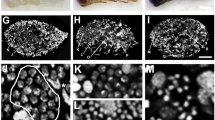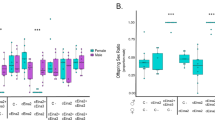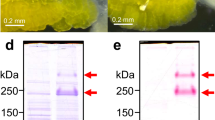Abstract
IN a letter to NATURE, published July 23, 1927, I showed, on the basis of experimental evidence, that Puccinia helianthi is heterothallic. The results of further experiments now enable me to state definitely that Puccinia graminis is also heterothallic. Moreover, since my first letter was written, proof has been obtained that the pycnia (spermogonia) of the Rust Fungi are not, as many botanists have supposed, male conceptacles producing non-functional spermatia, but are active organs having a non-male function which they carry out through the agency of flies. This discovery was made as follows.
This is a preview of subscription content, access via your institution
Access options
Subscribe to this journal
Receive 51 print issues and online access
$199.00 per year
only $3.90 per issue
Buy this article
- Purchase on Springer Link
- Instant access to full article PDF
Prices may be subject to local taxes which are calculated during checkout
Similar content being viewed by others
Author information
Authors and Affiliations
Rights and permissions
About this article
Cite this article
CRAIGIE, J. Discovery of the Function of the Pycnia of the Rust Fungi. Nature 120, 765–767 (1927). https://doi.org/10.1038/120765a0
Issue Date:
DOI: https://doi.org/10.1038/120765a0
This article is cited by
-
Multiple genotypes within aecial clusters in Puccinia graminis and Puccinia coronata: improved understanding of the biology of cereal rust fungi
Fungal Biology and Biotechnology (2017)
-
Role of Berberis spp. as alternate hosts in generating new races of Puccinia graminis and P. striiformis
Euphytica (2011)
-
The diversity of nuclear cycle in microcyclic rust fungi (Uredinales) and its ecological and evolutionary implications
Mycoscience (2002)
-
Life cycle and nuclear behavior in three rust fungi (Uredinales)
Mycoscience (2002)
Comments
By submitting a comment you agree to abide by our Terms and Community Guidelines. If you find something abusive or that does not comply with our terms or guidelines please flag it as inappropriate.



